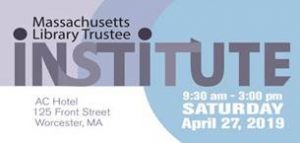🕙 MBLC Monthly Board Meeting on October 9th (Hybrid)
Contact: Rachel Masse
The regular monthly board meeting of the Massachusetts Board of Library Commissioners is scheduled for 10AM on Thursday, October 9th, 2025, at the Nevins Library in Methuen.
✨Nominate a Library Champion for the MBLC Commissioner Awards by October 1!
Contact: Celeste Bruno, Rachel Masse, June Thammasnong
This year, the MBLC is celebrating 135 years by honoring the individuals whose work has carried forward the legacy of our founding Commissioners with the Commissioner Awards. We invite you to nominate a librarian, public official, and/or state legislator who has made outstanding contributions to libraries and residents in the Commonwealth. Please submit your nominations by October 1st at tinyurl.com/2025-comm-awards
📰 Big Turnout for Gloucester’s New Library
Contact: Celeste Bruno
Massachusetts Board of Library Commissioners (MBLC) members Joyce Linehan and Jessica Vilas Novas joined Lieutenant Governor Kim Driscoll, State Senate Minority Leader Bruce Tarr, State Representative Ann-Margaret Ferrante, and local and state officials to congratulate the Gloucester community on the opening of the new Sawyer Free Library. To read more about Gloucester’s new library, visit the MBLC website.
🤝So You Want to Be a Library Trustee? (Online)
Contact: Al Hayden
Wednesday, September 24 at 7PM – More Information & Registration
Do you want to do more to advocate on behalf of your local public library? Are you considering running to be a Library Trustee? Join Rob Favini, Head of Library Advisory & Development/Government Liaison and Al Hayden, Library Advisory Specialist from the MBLC as they provide information about what your library does for your community, the role of a Library Trustee, what responsibilities you’ll encounter should you become a successful candidate, and what supports and resources the MBLC offers to the library community and its advocates. This program is a basic primer designed for people who are considering becoming a Library Trustee in their community, though new Trustees may find valuable information and are welcome to attend as well. This session will be recorded and slides will be shared with all who register, regardless of whether or not they are able to attend live. To encourage frank questions and open discourse, the Q&A session will NOT be recorded.
📝-NEW BLOG POST- The History of the MBLC: Henry Nourse Stedman
Contact: Jessica Branco Colati
We’re delighted to announce the launch of a new blog series, The History of the MBLC, by MBLC Preservation Specialist Jessica Branco Colati. This recurring series will highlight and explore key figures and events that have shaped the MBLC since 1890. The first group of posts will focus on our founding Commissioners in recognition of the agency’s 135th Anniversary. The latest post profiles Henry Nourse Stedman, one of the founding Commissioners who was also a Civil War veteran, state legislator, author and historian. To learn more about Commissioner Nourse, visit the MBLC Blog.
🗓️Financial Report Closes on Friday, October 3rd
Contact: Cate Merlin, Jen Inglis
State Aid season continues! The FY26 Financial Report survey will close on Friday, October 3rd. Waiver applications are due on Friday, November 7th. Sign up for the State Aid Listserv for updates and information. Don’t hesitate to reach out to the State Aid team if you have any questions or concerns. More information and dates can be found at at the MBLC website.
💬 State Aid + Financial Report Weekly Drop In Hours (Online)
Contact: Cate Merlin
Tuesday, September 30th at 3pm – Zoom Link
Wednesday, October 1st at 9am – Zoom Link
Thursday, October 2nd at 3pm – Zoom Link
Drop in to ask last minute Financial Report, State Aid, and Waiver questions. Make sure your budget, materials spending, and hours open fully meet State Aid requirements. Registration is not required, and session and chats will not be recorded or saved.
💻 E-Rate: Form 470
Contact: Jaccavrie McNeely, Kate Butler
Wednesday, October 1 at 10AM – Registration & More Information
In this second of our series of funding year 26 (FY27 – July 1, 2026 to June 30, 2027) E-Rate webinars, Aleck Johnson from EdTech Strategies will cover:
- Basics of the Form 470
- Step by step walkthrough of filing the form 470
Later trainings will include bid evaluation and vendor selection, Form 471, the application review process, Form 486, and invoicing. Feel free to suggest additional topics if you have questions!
💻 Web Accessibility Office Hours
Contact: Jaccavrie McNeely, Kate Butler
Friday, October 3 at 11AM – More Information & Zoom Link
Wednesday, October 15 at 3PM – More Information & Zoom Link
Need help making your web content accessible? MBLC staff are here to help! Join our office hours every first Friday at 11AM or third Wednesday at 3PM. View all upcoming Web Accessibility programming under the Internet, Technology, and Access category on our calendar.
🤝Library Advisory Office Hours (Online)
Contact: Al Hayden
Monday, October 27 at 2PM – More Information & Zoom Link
Open to all Directors, Trustees, Library Friends, and Foundation Members. They are designed to be an open-ended, safe space for questions and interaction among participants. Sessions will NOT be recorded, and chats will NOT be saved. Registration is not required; stop by anytime during the hour!
📅 Social Services in Libraries Roundtable (Online)
Contact: Ally Dowds
Wednesday, October 15 at 11AM – Registration & More Information
Explore how libraries can enhance community support through social services. Connect with librarians, social workers, and social service providers to share insights, success stories, and practical tips.
Event Highlights:
- Discussions on integrating social services in libraries.
- Real-life examples and best practices.
- Networking opportunities with professionals, community organizations and community members.
October’s topic for discussion: How are you or your library working toward creating a culture of safety?
📅 Save the Date! Demystifying Mental Health: A Community Forum
Contact: Ally Dowds
Saturday, October 18 11AM to 4PM – Registration & More Information
Join the Massachusetts Department of Mental Health, Office of Behavioral Health Promotion and Prevention, and William James College for the Demystifying Mental Health Community Forum. A time for real talk about inclusive, culturally rooted approaches to mental well-being for everyone. The forum is free of charge and takes place at Union United Methodist Church in Boston. Visit the MA Dept. of Mental Health website for more information and to register to attend.
🤝Annual MLTA Trustee Conference
Contact: Al Hayden
Saturday, November 1, 10AM to 1PM – Registration & More Information
The Massachusetts Library Trustee Association (MLTA) will hold their annual conference this year on Saturday, November 1 at the Shrewsbury Public Library, 609 Main St., Shrewsbury, MA 01545. Please register in advance as space is limited and lunch will be provided.
The MLTA conference is a great opportunity for trustees across the state to interact with each other, learn new approaches to advocate for their library, have conversations about challenges you’re facing, and trade stories about successes.
🕙 MBLC Monthly Board Meeting on November 6 (Hybrid)
Contact:Rachel Masse
The regular monthly board meeting of the Massachusetts Board of Library Commissioners is scheduled for 10AM on Thursday, November 6, 2025, at the State House.



